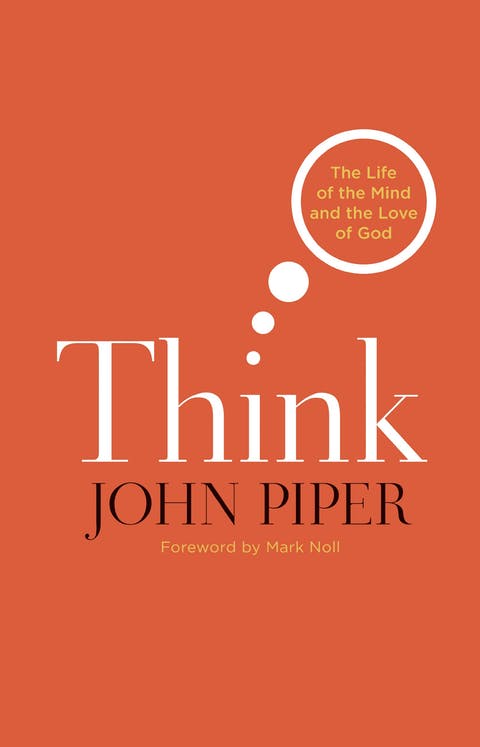There are a number of things I wish I learnt how to do much earlier in my life. One of them is how to think. In the circles where I began my Christian walk, the use of the mind in living out the Christian life was often neglected. And even worse, it was even ridiculed. I used to believe we could divorce worship and discipleship from thinking.
John Piper presents a case for the careful use of the mind by Christians in his book Think: The Life of the Mind and the Love of God (available for free here). Piper certainly qualifies to write this book. As an academic he spent six years teaching at college and then decades leading a church. Therefore he doesn’t only know about the use of the mind, but also the human soul. As a pastor-scholar, Piper has earned the right to write about the use of the mind in the Christian life.
Thinking is essential, and understanding is a gift from God.
In this book, Piper aims to show his readers how thinking is a means of joyfully glorifying God. He builds his case from two biblical passages. They are 2 Timothy 2:7 and Proverbs 2:1-6. Piper argues that both call on Christians to use their minds to seek and receive understanding. In other words, the Christian is to seek understanding, and God will give understanding. Thinking is essential, and understanding is a gift from God. These go together.
Human Thinking and Divine Illumination
Paul writes: “Think over what I say, for the Lord will give you understanding in everything” (2 Timothy 2:7). Many people would go off course with this verse, veering towards one of two extremes. The one extreme highlights, “Think over what I say.” It overemphasises the crucial role of thinking, often at the expense of the illuminating work of God in giving understanding. The other extreme stresses the second part of the verse, “The Lord will give you understanding.” This extreme underscores the futility of mental exertion without the supernatural work of God.
Careful thinking and God-given understanding are not enemies.
Instead of falling into either extreme, Piper urges us to see “the relationship between our thinking and God’s illuminating” (p64). He pleads for a both/and life, not pitting understanding against illumination. Instead of seeing the act of human thinking as being opposed to God’s act of divine illumination, we ought to see both as essential. Careful thinking and God-given understanding are not enemies. Thinking without prayerful trust for God’s gift of understanding is as bad as waiting for God’s gift of understanding without carefully thinking.

Think: The Life of the Mind and the Love of God
John Piper
Think: The Life of the Mind and the Love of God
John Piper
We often pit thinking and feeling against each other, especially when it comes to the Christian experience. Glorifying God with our minds and hearts, however, is not either-or, but both-and. Focusing on the life of the mind will enable you to know God better, love him more, and care for the world. This book will help you think about thinking, and about how the heart and mind glorify God together.
The Mind is Indispensable for the Christian Life
The Bible is where we find the clearest and most authoritative knowledge of God. And since the Bible is a book, it requires thinking. This is because reading involves thinking. Since we are called to carefully read and apply God’s word to our lives, we cannot deem thinking is valueless. “There is no reading without thinking. And there is no reading carefully and faithfully and coherently without thinking carefully and faithfully and coherently” (p123).
Since we are called to apply God’s word, we cannot deem thinking is valueless.
The duty of the Christian then is to work hard in order to understand what a biblical author intended to convey. The Christian’s duty is to carefully make observations of the text, humbly ask questions, and work hard to answer the questions.
The Christian Loves God with her Mind
Not only is thinking necessary to the understanding and application of God’s word to our lives, God commands the Christian to love him with all of their mind (Matthew 22:37). And this cannot be divorced from faithful thinking. “To love God with the mind is to love him in the way we use our mind to think” (p84).
Just as fire needs fuel for its survival, love for God needs the fuel of thinking.
To love God with our minds is to fully engage our thinking, “to know God as fully as possible in order to treasure him for all he’s worth” (p90). In other words, there can be no love for God without a knowledge of God. If such a love for God exists, one which does not naturally come from knowing God, it can’t be called love for God. “Thinking feeds the fire” (p89). Just as fire needs fuel for its survival, love for God needs the fuel of thinking.
Thinking that Leads to Worship
But there are some who still believe that thinking has no value for the Christian life. They argue that the life of the mind has done more harm than good to the church. They point to those who think much but feel little, men and women who are merely clever and almost never practical. Christian history is full of barren intellectuals, rich minds with poor lives.
Piper agrees that such an approach to thinking and knowledge is always unhelpful to the church. But he argues that “the remedy for barren intellectualism is not anti-intellectualism, but humble, faithful, prayerful, Spirit-dependent, rigorous thinking” (p123). This kind of thinking is required to deeply know God and spread the gospel. This kind of thinking is never impractical. Rather, it will result in enriched faith and effective gospel witness.
Humble Thinking
Piper is not shy to point out a common danger present in all intellectual exertions: pride. A great Christian mind can easily lack humility. Pride is a real danger when we engage in serious intellectual effort, but that doesn’t mean that thinking is the problem; pride is. Piper advocates for humble thinking, and offers two remedies for pride, based on 1 Corinthians 8:1-3:
Pride is a real danger in serious intellectual effort, but that doesn’t mean that thinking is the problem.
- Understanding that true knowing and true thinking produces love for God and people. True knowledge loves God and builds people up. “Thinking that produces pride instead of love is not true thinking” (p160)
- Our loving God is owing to God’s free gift of election. If we love and know God rightly, it is only because we have been known and chosen by him.
Piper understands that “thinking is dangerous and indispensable. Without a profound work of grace in the heart, knowledge–the fruit of thinking–puffs up” (p164-165).
All Scholarship is for the Love of God and Man
Piper believes that God has two books: the Bible and the world. And he implores us to see that the truth of 1 Corinthians 8:1-3 is not only to be applied to our knowledge of God through his word, but also to “the knowledge of God through his other ‘book’—the world of nature and human life” (p166).
True knowing and true thinking produces love for God and people.
This means that “all thinking—all learning, all education, all schooling, formal or informal, simple or sophisticated—exists for the love of God and the love of man” (p166). Therefore, whatever we think, read or learn about should involve studying reality as a manifestation of God’s glory revealed in his world (Psalm 19:1; Romans 1:19-21). As a Christian, God enriches your mind in order to bless his church. We must then speak and/or write about it with accuracy, making it serve the good of others.
Piper Models what He Exhorts
Perhaps the greatest strength of this book is that it doesn’t deal with the subject dryly. John Piper, a serious thinker himself, writes with the touch of a pastor who has dealt with people and has had to explain complex ideas simply. His gift of exposition will be much appreciated in the book, especially in his dealing with often misunderstood biblical texts. Also, in dealing with those oft-misunderstood texts, he practically shows his readers how to think. This isn’t mere theory—it’s practical at its core!
I pray you will consider Piper’s call for serious thinking in the Christian life.
Piper’s book will serve both the formally trained and the untrained believer. It will be helpful to the man or woman who has never been presented with a case for serious thinking in the Christian life, and beneficial to the seasoned thinker who longs to know and love God more. I pray you will consider Piper’s call for serious thinking in the Christian life, and that your thinking will lead you to greater love for God and service of his people.











